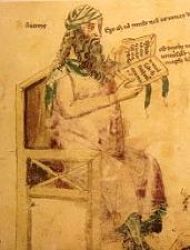149 - Back to Basics: Averroes on Reason and Religion
An introduction to “the Commentator” Averroes, and his defense of philosophy in the Decisive Treatise
Themes:
• Averroes, On the Harmony of Religion and Philosophy, trans. G.F. Hourani (London: 1976).
• Averroes, Tahāfut al-Tahāfut, trans. S. Van Den Burgh (Cambridge: 1954).
• P. Adamson, “Yaḥyā Ibn ʿAdī and Averroes on Metaphysics Alpha Elatton,” Documenti e Studi sulla Tradizione Filosofica Medievale 21 (2010), 343-74.
• P. Adamson and M. Di Giovanni, Interpreting Averroes: Critical Essays (Cambridge: 2018).
• J.A. Aertsen and G. Endress (eds), Averroes and the Aristotelian Tradition (Leiden: 1999).
• C. Cerami, Génération et Substance: Aristote et Averroès entre physique et métaphysique (Berlin: 2015).
• M. Di Giovanni, Averroè (Rome: 2017).
• T.-A. Druart, “Averroes on the Harmony of Philosophy and Religion,” in Averroes and the Enlightenment, ed. M. Wahba and M. Abousenna (Amherst NY: 1996), 253-62.
• R.C. Taylor, “Truth Does Not Contradict Truth: Averroes and the Unity of Truth,” Topoi 19 (2000), 3-16.
• R.C. Taylor, “Ibn Rushd/Averroes and ‘Islamic’ Rationalism,” in Medieval Encounters 15 (2009), 225-35
Digital Averroes Research Environment

Andalusia


 ..
..



Comments
Help Please
Hi Peter, as always loving the podcasts.
Just a query, I'd like to read your article on Yahya Ibn Adi:
P. Adamson, “Yaḥyā Ibn ʿAdī and Averroes on Metaphysics Alpha Elatton,” Documenti e Studi sulla Tradizione Filosofica Medievale 21 (2010), 343-74.
But I can't seem to find it on JSTOR. Do you know if it's on there somewhere? This is a journal article right?
In reply to Help Please by Jeremy
Ibn Adi article
If you email me (peter.adamson@lrz.uni-muenchen.de) so that I have your address, then I will send you a .pdf.
Which Ibn Rushd was Averroes?
Okay hold it, exactly which Abu'l Walid Ibn Rushd are we refering to here, the Maliki jurist and philosopher who died in 1126 or his grandson, Abu'l Walid Ibn Rushd, who died in 1198 and (if things weren't confusing enough) also happened to be a Maliki jurist and philosopher?
In reply to Which Ibn Rushd was Averroes? by Yusi
which Ibn Rushd?
We're talking about Abū l-Walīd Muḥammad ibn Aḥmad ibn Muḥammad Ibn Rushd who died in 1198; he's the famous one. You're right that his forebears were also jurists, though I have never heard that his grandfather was also a philosopher.
Averrroes
I listened to a recent podcast on NPR about Averrroes, which was excellent. I thought you and your listeners might want to hear it:
https://www.npr.org/2019/10/09/768651310/the-commentator
I knew of your podcast series and wanted to learn more about Averrroes. The first episode (this one) was excellent, and went into more detail. I look forward to deepening my knowledge of Averroes and Islamic philosophy here.
Steve Sverdlik
In reply to Averrroes by Steve Sverdlik
Averroes on NPR
Wow, I didn't know about that! Thanks for letting me know. I was once on the BBC radio show "In Our Time" to talk about Averroes, you can find the link under Links below.
The question of mimesis in Ibn Rushd
Borges recounts this story about Ibn Rushd's difficulty with translating the concepts of tragedy and comedy from Aristotle's Poetics into Arabic? Do you have any insights on this?
In reply to The question of mimesis in Ibn Rushd by Robert Beshara
Borges and Averroes
Right, that is a very charming and famous passage - even more charming may be that Borges' story breaks off on the grounds that he is just as unable to imagine Averroes' mental life as Averroes was unable to imagine Aristotle's.
The basic idea of Borges' story is that Averroes wouldn't have understood that Aristotle was describing a theatrical performance, since in Islamic culture they instead had poetic recitation. This is probably true to a significant extent, but it should be born in mind that there was certainly mimetic poetry in Arabic and the idea of imitation of action comes through very clearly in the Arabic version of the Poetics. So if Averroes was unable to grasp what Aristotle was talking about, it would be more in terms of things like not understanding about actors on a stage, wearing masks or whatever, and not about the idea of mimesis as such.
THE QUESTION ABOUT TIME ACCORDING TO IBN RUSHD
Hi Peter, Many thanks to you for this amazing podcast. Actually, I have read some of your writings in philosophy such as "Averroes: A Rationalist in Islam", "Aristotle and the Arabic Tradition", "The theology of Aristotle" and "Galen and al-Rāzī on Time". All of them are really amazing. And after reading some of your writings, I am a little interested in researching ibn rushd's theory of time and seeing ibn rushd's position in the theory of time with Aristotle's theory of time. In this regard, may I ask for suggestions on references that can be used for my research? Thank you for your consideration and forthcoming response.
In reply to THE QUESTION ABOUT TIME ACCORDING TO IBN RUSHD by Nala Alfia Chusna
Ibn Rushd on time
Well the main source for that would actually be his Long Commentary on the Physics which is only preserved in Latin translation. So actually the best thing to look at might be Cecilia Trifogli's book on Latin physics commentaries:
C. Trifogli, Oxford Physics in the Thirteenth Century (ca. 1250-70): Motion, Infinity, Place and Time (Leiden: 2000).
(I talked about that in episode 226.)
But you could also check out the secondary literature on his Incoherence of the Incoherence, where he responds to Ghazali on the topic of eternity. For instance Taneli Kukkonen has a good article on that.
Thanks by the way for your kind words about my work!
Add new comment